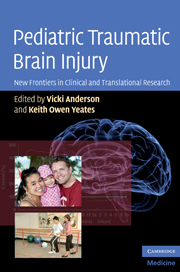Book contents
- Frontmatter
- Contents
- List of contributors
- Acknowledgments
- Introduction: Pediatric traumatic brain injury: New frontiers in clinical and translational research
- 1 Biomechanics of pediatric TBI
- 2 Neurobiology of TBI sustained during development
- 3 Using serum biomarkers to diagnose, assess, treat, and predict outcome after pediatric TBI
- 4 Clinical trials for pediatric TBI
- 5 Advanced neuroimaging techniques in children with traumatic brain injury
- 6 Neurobehavioral outcomes of pediatric mild traumatic brain injury
- 7 Very long-term neuropsychological and behavioral consequences of mild and complicated mild TBI: increased impact of pediatric versus adult TBI
- 8 Neurobehavioral outcomes of pediatric traumatic brain injury
- 9 Neuropsychological rehabilitation in children with traumatic brain injuries
- 10 Psychosocial interventions
- 11 Pediatric TBI: challenges for treatment and rehabilitation
- 12 Integrating multidisciplinary research for translation from the laboratory to the clinic
- Index
- Plate section
- References
8 - Neurobehavioral outcomes of pediatric traumatic brain injury
Published online by Cambridge University Press: 14 May 2010
- Frontmatter
- Contents
- List of contributors
- Acknowledgments
- Introduction: Pediatric traumatic brain injury: New frontiers in clinical and translational research
- 1 Biomechanics of pediatric TBI
- 2 Neurobiology of TBI sustained during development
- 3 Using serum biomarkers to diagnose, assess, treat, and predict outcome after pediatric TBI
- 4 Clinical trials for pediatric TBI
- 5 Advanced neuroimaging techniques in children with traumatic brain injury
- 6 Neurobehavioral outcomes of pediatric mild traumatic brain injury
- 7 Very long-term neuropsychological and behavioral consequences of mild and complicated mild TBI: increased impact of pediatric versus adult TBI
- 8 Neurobehavioral outcomes of pediatric traumatic brain injury
- 9 Neuropsychological rehabilitation in children with traumatic brain injuries
- 10 Psychosocial interventions
- 11 Pediatric TBI: challenges for treatment and rehabilitation
- 12 Integrating multidisciplinary research for translation from the laboratory to the clinic
- Index
- Plate section
- References
Summary
Introduction
The multiple roles of neurobehavioral assessment in evaluating outcomes after TBI are to: (1) describe the effects of injury on cognitive skills, behavior, and educational progress; (2) determine how these outcomes are related to the brain insult and to any ensuing abnormalities in neural development; (3) identify environmental and psychosocial factors that add to or moderate the effects of brain pathology on these outcomes; and (4) specify the cognitive deficits that contribute to problems in behavior and scholastic achievement. Assessment is guided by existing knowledge and theory regarding TBI-related brain insults, the neuropsychological and developmental effects of these insults, other influences on children's development such as the home or school environments, and the relation of cognitive impairments to behavior and learning. By adding to this knowledge base, assessment findings can point to the need for refinements in the evaluation process and inform efforts to improve outcomes.
The primary objective of this chapter is to describe neurobehavioral outcomes of TBI in children and emphasize the need for further, methodologically sound investigation in this area. Consistent with the emphasis of this volume on “translational” research, progress in understanding the nature and determinants of injury consequences can be measured by the degree to which findings from individual cases can inform research design, as well as by the relevance of research findings to evidenced-based management of individual children.
- Type
- Chapter
- Information
- Pediatric Traumatic Brain InjuryNew Frontiers in Clinical and Translational Research, pp. 145 - 168Publisher: Cambridge University PressPrint publication year: 2010
References
- 7
- Cited by

